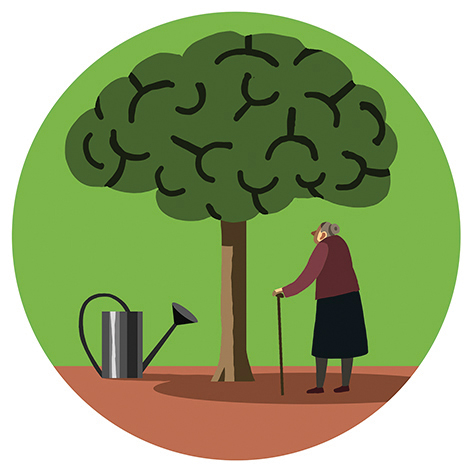
The first time Jocelyn Chen Wise visited Eleanor’s* northeast Atlanta apartment, she was shocked by the squalor. The bedroom was infested with cockroaches. The fridge was mostly empty. Nothing had been cleaned in ages. The biggest problem, though, wasn’t the octogenarian’s apartment, but the paranoia that trapped her inside. Eleanor’s family members, who also struggled with mental illness, were unable to help, and she grew frail and malnourished.
“She was spiraling,” recalls Wise, a project director with Emory University’s Fuqua Center for Late-Life Depression, who was tasked with bringing services to seniors living in the Atlanta Housing Authority’s high-rises. Wise realized Eleanor needed psychiatric and medical treatment and called a social worker at Adult Protective Services, then Wesley Woods Hospital to reserve a bed, followed by Emory Healthcare for an ambulance.
In Georgia one in five adults suffer from some kind of mental illness, and the rate is higher in adults over age 60. Depression also often gets overlooked as a side effect of dementia, Alzheimer’s, or Parkinson’s disease.
“When people get older, they fall off the map in terms of mental health services,” says Dr. William McDonald, a geriatric psychiatrist who heads the Fuqua Center. There’s an assumption that getting old means becoming senile and, along with that, a slow decline of mental well-being. But “depression is not a normal part of aging,” says Fuqua Center project coordinator Cathy Rambach. “Just because Grandma is old, it doesn’t mean she should be withdrawn, uninterested in what made her happy before.”
The Fuqua Center was created in 1999 with a $1 million donation from J.B. Fuqua—the late businessman and philanthropist who fought depression for five decades—and a mission to improve access to depression treatment for older adults and increase understanding of mental health issues affecting seniors. Part of the Emory Brain Health Center, McDonald’s team helps seniors find mental health services and assists providers in better addressing the needs of their aging clients. The Fuqua Center’s work ranges from training employees of partnering agencies like the AHA (think maintenance workers fixing the air conditioners) to identify early signs of depression in their clients, to researching new ways to treat mental illness in the elderly.
The end goal is to allow seniors like Eleanor to remain happy, healthy, and independent for as long as possible. After Wise’s intervention, Eleanor spent nearly two weeks in the hospital, where doctors diagnosed her with psychosis and mild cognitive impairment, as well as underlying physical ailments, including vitamin deficiencies and malnutrition. Slowly but surely, she gained weight, eating triple helpings of hospital food, and her mental state improved. Once she was discharged, the Fuqua Center helped place Eleanor in a top-notch personal care home.
“It was a modest place,” Wise says. “But they loved having her there, they took good care of her, and she looked so much better. She had a total turnaround.”
* Name has been changed
Cast your vote for Groundbreaker of the Year
This article originally appeared in our September 2016 issue.













